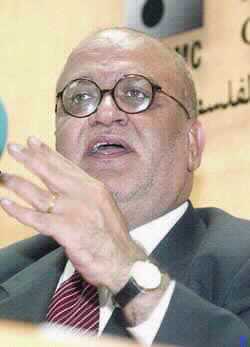- Author:
& News Agencies - Section:
WORLD HEADLINES
- Hajj & Umra WORLD HEADLINES
Israelis, Palestinians Hold First Talks in Weeks

Palestinian and Israeli officials have held their first high-level talks in several weeks to set the agenda for further ministerial meetings, the two sides said on Thursday. Although no breakthrough was announced, the discussions between Israeli Foreign Minister Shimon Peres and chief Palestinian negotiator Saeb Erekat in Jerusalem late on Wednesday signaled a desire at least to maintain dialogue.
The meeting followed talks in Washington between Israeli Prime Minister Ariel Sharon and President Bush on Wednesday and precedes a visit to the Middle East by the chief U.S. mediator in the region.
U.S. Assistant Secretary of State William Burns will be taking stock of the situation during a two-week trip starting in on Friday after a meeting in Paris with other mediators.
Despite the flurry of meetings, there is little hope of a quick end to the two years of bloodshed since the Palestinians rose up for independence in the West Bank and Gaza Strip in September 2000.
Erekat and Peres discussed the release of frozen Palestinian revenues and more Israeli occupation troop withdrawals from the West Bank.
"It was decided that expanded teams from the two sides would meet early next week," a Palestinian official said, giving few details. Israel's Foreign Ministry called it a "preparatory meeting."
Israeli occupation troops have reoccupied most of the Palestinian-ruled cities in the West Bank since a series of resistance bombings in Israel but the government is considering pulling occupation troops out of Hebron following a withdrawal from Bethlehem.
Defense Minister Binyamin Ben-Eliezer said Israel was considering such a withdrawal after Washington, its key ally and the main Middle East peace-broker, criticized occupation army raids which were intended to rein in resistance men but which killed civilians.
ISRAEL TO PRESS ON WITH MILITARY ACTIONS
Despite such criticism, a senior Israeli official told reporters after Sharon met Bush that Israel would not scale back its occupation army actions against Palestinian resistance men and had not been asked to do so.
Both Bush and Sharon share a goal of replacing Palestinian President Yasser Arafat with new leaders who the U.S. president said should not be "compromised by terror."
"There will be no retreat from our struggle against terror, not now, not in the future nor during any campaign that might or might not take place," the senior Israeli official said.
Israeli daily newspapers said Bush had handed Sharon a "road map" for forging a final peace agreement.
By the middle of 2003, Palestinians should stop attacks on Israelis, carry out reforms and put their security occupation forces under a unified command while Israel should freeze Jewish settlement construction and withdraw from Palestinian cities, the reports in the dailies Maariv and Yedioth Ahronoth said.
Six months later, Palestinians should hold elections and an international committee would declare a temporary state, with a permanent accord to be reached by the end of 2005, they said.
The details could not be confirmed independently.
Bush and Sharon paved the way for the discussions on the release of Palestinian funds frozen by Israel by issuing a joint statement on the transfer of the money.
The statement outlined Israeli agreement to "consider favorably the gradual and scheduled transfer" of all Palestinian Authority tax funds collected by Israel as long as U.S.-led monitoring ensures the money is used to help Palestinian civilians, not bankroll resistance man violence.
Transfers of the customs and valued added tax receipts, amounting to 420 million dlrs, were suspended by Israel in a punitive measure at the start of the uprising.
At least 1,616 Palestinians and 604 Israelis have been killed since the uprising began in September 2000 after negotiations on terms of Palestinian statehood foundered.
PHOTO CAPTION
Israeli Foreign Minister Shimon Peres met with a senior Palestinian delegation headed by chief negotiator Saeb Erakat in Jerusalem, Wednesday, a senior Palestinian official told AFP.
Related Articles
 Hajj virtues
Hajj virtues
-
School of Faith in Ten Days of Thul-Hijjah
The believing human self needs strong provocations in order to awaken whenever it is enveloped by laziness in...
-
The Status of Hajj in Islam
Hajj is the fifth pillar of Islam; Allah, The Exalted, ordained it in the ninth year after Hijrah (the Prophet's,...
-
School of Faith in Ten Days of Thul-Hijjah
The believing human self needs strong provocations in order to awaken whenever it is enveloped by laziness in relation...


 Home
Home Discover Islam
Discover Islam Quran Recitations
Quran Recitations Lectures
Lectures
 Fatwa
Fatwa Articles
Articles Fiqh
Fiqh E-Books
E-Books Boys & Girls
Boys & Girls  Hajj Rulings
Hajj Rulings Hajj Fatwas
Hajj Fatwas












